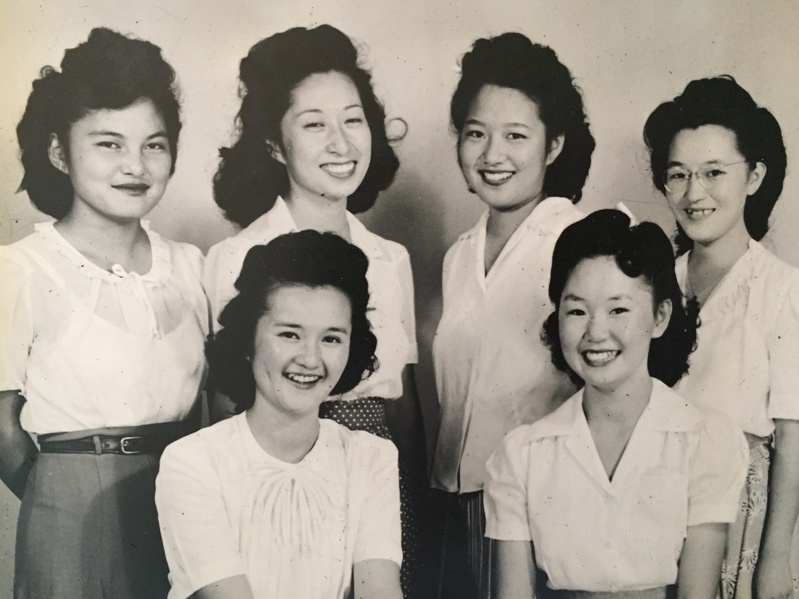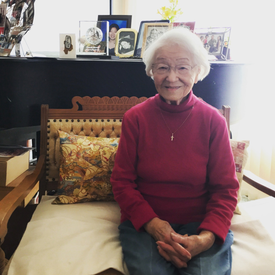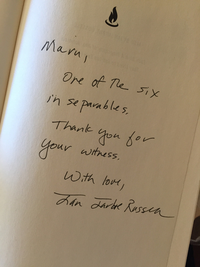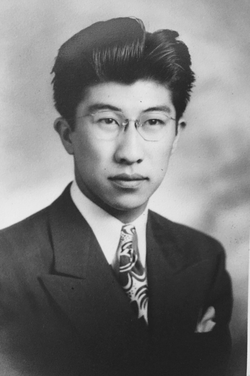I know even in camp when it was declared Japan lost the war, some of these men were very adamant about Japan, they just couldn’t believe it. They went back to Japan thinking that they did not lose the war. But the Japanese, they’re just so strong.
— Maru Hiratzka
The story of Maru Hiratzka’s life during the war is really a love story. After family decisions took her and her high school sweetheart, Jordan Hiratzka, in opposite directions (she to Texas and Jordan to Utah), they never stopped writing to each other. And when Maru nearly left the states to go to Japan, Jordan’s father arranged for her to come to Utah instead to wait for Jordan, who was serving in the Military Intelligence Service overseas.
Eventually they married, had two children, and a life that Maru speaks of with fond memories. “Jordan was fun-loving, everyone liked him.” It seems he took after his father, Paul, whom Maru continues to regard with the utmost respect. “I just admired him. He was such a humble man.” Paul Hiratzka was the kind of person who thought ahead, made smart decisions and took initiative to make their lives in the U.S. a little easier. The spelling of Hiratzka hints at this. Originally spelled “Hiratsuka,” Paul changed it to “z” to make it easier for non-Japanese people to pronounce.
Maru and Jordan would spend their entire lives together until Jordan’s tragic passing in a car accident in 2001. “He always said ‘I hope I don’t linger, I hope I never have to go through being sick.’ He certainly didn’t,” says Maru. “He had so much to give to life.”
Let’s start with the story of how you and your husband met.
We grew up together in Santa Maria, California. He was half a year ahead of me in high school. He graduated summer of ’41 and I graduated December ’41. Just in time, I was the last class to graduate before Pearl Harbor.
Were you two a couple in high school?
Yeah, well, we did a group thing. And so we were always, always together. And later we just kind of paired off after high school. Went to his senior prom, then we went to camp right after that.
So you went to the same camp?
First we went to an assembly center in Tulare. Then they shipped us to Gila, Arizona. Then from Gila we separated. His father [Paul] was in Montana with all the men. Jordan was in Gila with his mother and sister. When his dad got released from Montana, he went to Ogden, Utah because his son Tom was there. So he wrote and got Jordan, and his mother, and sister released from Gila. So they were sent to Ogden, too. They went in March of ’43. And in April, my dad was in Santa Fe, New Mexico, he was separated from us too. The men sent in a petition to say “We want to be with our families.’ So Papa wrote us in Gila to say that they’re starting a camp in Crystal City, Texas so we’ll be together again. So April of ’43 my mother, my two brothers and I and my aunt who lived with us–we were put on a train to Texas. That was a long, long trip. Crystal City camp was altogether different.
What do you remember about that camp?
I remember that camp well, because we were there two and a half years. Crystal City was different because there were many people from Hawai’i who came and many of them were Buddhist priests or Japanese teachers because they were the so-called dangerous ones. Then we, the mainlanders, were the next group that came from all the other camps. So we met people from everywhere in Crystal City. Then later the Peruvians came. Of course there less than ten Italians and two or three hundred Germans. But they were the “pro-Nazis.”
So the Germans were actual Nazi sympathizers in the camps?
They called them the American Bund leaders. They were very friendly because we were all in the same camp, of course they had the German section, the Japanese section. But we could walk around everywhere. And they [Germans] made the best bread, they took care of the bakery. My dad worked in the laundry, our parents were put to work in the grocery store, the laundry, the hospital, maintenance. But the Germans would come strolling in our area with their dogs, and they were very friendly.
Why was your father separated by the FBI?
Well, Santa Maria valley is agriculture country. We aren’t farmers but most of the people were farmers and they contributed money to the Japanese government. And once you do that you’re on a blacklist. The FBI all had records. And Jordan’s father especially, my father-in-law, he was a community leader, of Nihonjin-kai and things like that. And he used to work with people at the consulates and embassy in San Francisco and Los Angeles. He spoke English perfectly, so he knew the local police officers. They called him by name, Paul. So he was very prominent, in other words.
So December 7th, that night, Jordan and his sister Amy were home. Because mom and dad went to LA to attend a big dinner at a Chinese restaurant with dignitaries from the LA area. It was a big Japanese kind of a thing. So they were down there. Jordan said at about 9 o’clock at night, the bell rang the front door and someone knocked at the back. Jordan says he went to the front door and Amy went to the back. They said “We’re looking for Paul Hiratzka.” He said the front door was a local police who knew Paul Hiratzka and the whole family and the back door was the FBI. And they came in and wanted Paul. They told them he’s in Los Angeles, attending a dinner. So they said, “You two will have to come to the police station with us.” So Amy and Jordan were taken with them to the Santa Maria police station. Amy was so upset.
How old was she?
Amy had graduated high school in 1940. So they were both taken, she was crying. Jordan said they couldn’t do anything, they just had to sit there at the police station and wait. They came at 9 p.m., and at 4:00 in the morning they heard over the loudspeaker, “We got your man.”
Speaking about his father?
Yeah. So Jordan said after that they drove them home because they got his father. So Amy and Jordan came home. But the next day, Jordan came to high school. He was there he says, “I didn’t get any sleep hardly.” But why stay home? His dad was taken from LA in his hotel. His mom had to wait for other friends who were at the dinner who came from that same area so she could get a ride home.
Do you remember if she was upset?
Oh very much, she was very upset. They were sleeping when they came to the hotel to wake them.
That’s awful. I wonder what they had heard about Pearl Harbor, and if they knew what happened.
I wish I had Paul’s diary. But he said that they were driving with the Imamuras, and he saw newspaper extras once he got to LA which said ‘Japs Bomb Pearl Harbor.’ And he said it must’ve been dema [rumors, false]. So they went to the dinner.
Where is his diary now?
When he went to the police station after the hotel, he asked for a pen and tablet, and then he started writing and he wrote it in English. Jordan’s father for an Issei man was educated. In those days I don’t think many Issei men were educated. So he started writing his diary on December 7th.
Do you think he started one not only for a record but because he was afraid something was going to happen to him?
I think so, I think he just wanted to write everything that was happening. And he continued to keep a diary until he died. I just admired my father-in-law. He was such a humble man, he was educated but he treated everybody fairly. Everybody liked him. He was good.
Very well-respected.
Yes and he was a good Christian. After I got married to the family, I used to see him reading the Bible and studying. But his sense of humor, oh my goodness.
You were very lucky.
I know. Funny thing is Jordan’s mother was a very proud lady, proud Japanese lady. Kept things just so. Jordan’s father was very easy-going and loved everybody. And sometimes, she would be mad about something he would come over and say, “The Tsarina is on the path right now.” [laughs] He would call her the Tsarina. Who ever knew that word at that time? I didn’t, when I was so young. He’d make funny comments like that to us. He was a great guy.
What did he do after camp?
He went back to Ogden, Utah. And he decided to rent a large, three-story building and he said, ‘I’m going to start a place where people can come after camp.’ Kind of like a boarding house. He said, ‘Mama, I want you to do the cooking.’ She is a very proud lady, I can’t imagine her cooking for all kinds of people. But she did, she did. And she was a good cook. So after people were released from camp–single men, couples–came and rented a place in their apartment and stayed.
So word got around that he had a place for people.
Yes. They stayed for a number of years and joined the church there. And of course he had that apartment but he said I’ve got to earn some money. So he went to work at the local Union train station as a janitor. Another funny thing, he had poor eyesight. He had to take a test with his eyes. He said he studied the chart. [laughs] He was a great man.
* This article was originally publsihed on Tessaku on March 24, 2017.
© 2017 Emiko Tsuchida










